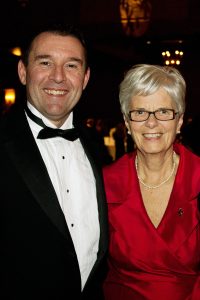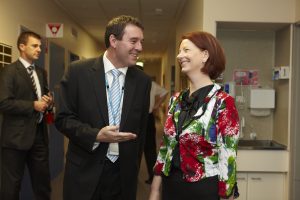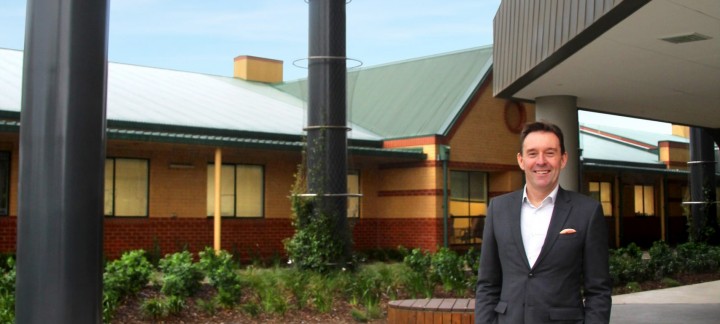When Stephen Cornelissen accepted his first role at Mercy Health in 2003, he planned to stay for three years. When now Adjunct Professor Cornelissen leaves Mercy Health in May 2022, he will have been with the organisation for 19 years, including 11 years in his current role as Group Chief Executive Officer.
Sr Helen Monkivitch RSM, herself a former CEO of the organisation, recalls interviewing Stephen for the role of General Manager of Werribee Mercy Hospital.
“He had been working in health in Australia and New Zealand and he was a lively and talented candidate but he hadn’t stayed anywhere for very long,” she recalls.
Helen told the panel to ‘snap him up’ before he went to another health service and she advised Stephen that ‘this time he had to stay’ — with Mercy.
Hence, the young Cornelissen family — Stephen and his wife Michelle and their three young children — left New Zealand and resettled in the west of Melbourne for Stephen’s new role.
Stephen recalls being attracted to the position because it combined working in public health with the Catholic and Mercy mission, and a strong community element.
“My leadership has always been about asking: Where are we doing public good and making a difference to the lives of those we are serving?” Stephen says.
Sr Helen Monkivitch features in his list of Mercy mentors, but when asked to name those who have most influenced his leadership, Stephen says, “I haven’t just learnt from the people above me, I think I have learnt from every person. I remember a gardener at Werribee Mercy Hospital who used to cut roses and deliver them to the patients’ rooms. It was just such a great example to me of someone having a clear focus on who they are really there to serve. That’s leadership. Everyone can show leadership.”

Adj Prof Stephen Cornelissen and Sr Helen Monkivitch RSM
Known for his inclusive and generous personal style, Stephen reflects on the growth of Mercy Health in the following 19 years, noting that the move into aged care, palliative care and mental health allowed the organisation to bring Mercy to people at every age and part of their lives.
Meanwhile, Werribee Mercy Hospital has grown from a small community hospital to a major training hospital with a proper emergency department, special care nursery and intensive care unit. Stephen says the relationship of the hospital with the local community has not changed, but the hospital will need to keep reimagining itself.
“In a little over 10 years, the hospital will need to be at least double and probably triple the current size to serve the health needs of the half a million people who will live in the City of Wyndham by then,” he says.
Stephen says he sees a bright future for Mercy Health, with a continuing focus on women’s health and perinatal health and a growing emphasis on mental health, ageing and end-of-life care.
“We are privileged to be in a position to push to the edges of society to bring care to those in need and to be a voice for the voiceless,” he says. “That’s what Catholic healthcare and Mercy Health can continue to offer our communities.”
“One of the Sisters of Mercy once said to me, ‘Mercy first gets on your skin and then it gets under your skin’ and it’s true, so as well as the career opportunities it has given to me, that is why I have stayed so long.”
Stephen will finish with Mercy Health in late May 2022 to commence as the Chief Executive Australian of Red Cross Lifeblood.

Adj Prof Stephen Cornelissen and Prime Minister Julia Gillard in 2010



